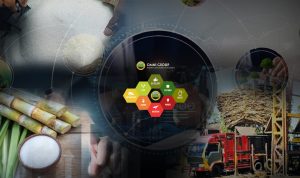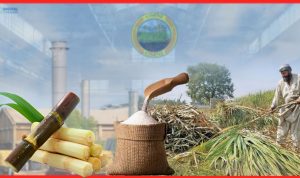Since its inception in 2004, Pak Ethanol, located in Malti, District Badin, Sindh, has been at the forefront of energy-efficient practices in the distillery industry. Under the visionary leadership of the Omni Group of Companies, including Khawaja Anver Majid (Founder and Chairman), Khawaja Abdul Ghani Majid (Group Chief Executive Officer), Khawaja Mustafa Majid, Khawaja Ali Kamal Majid, Khawaja Nimr Majid, and Khawaja Salman Younis, Pak Ethanol has implemented innovative solutions to power its operations sustainably. One of the key achievements is the effective use of biogas to cover 80% of the company’s energy requirements.
Advanced Distillation Process
Pak Ethanol’s distillation plant, installed by M/s. Tomsa Distil, S.L of Spain, utilizes the latest vacuum distillation and molecular sieve dehydration technologies. These state-of-the-art processes eliminate the need for chemical dehydration, enhancing the efficiency and quality of ethanol production. The primary raw material, molasses, is sourced from the group’s sugar mills, ensuring a consistent and high-quality supply for ethanol fermentation. The company produces 125,000 liters of ethanol daily, which is exported to markets in the USA, Europe, the Middle East, Japan, and Korea.
Biogas Plant: A Sustainable Energy Source
A cornerstone of Pak Ethanol’s energy efficiency is its biogas plant. This facility converts organic waste generated from ethanol production into biogas, which is then used to power the company’s turbines. This innovative approach significantly reduces the reliance on fossil fuels and minimizes environmental impact.
How the Biogas Plant Works
- Anaerobic Digesters: The plant employs anaerobic digesters where organic waste, primarily from molasses, undergoes decomposition in the absence of oxygen. This process produces biogas, a mixture of methane and carbon dioxide.
- Gas Holders: The biogas is collected and stored in gas holders before being transported to the turbines.
- Turbines: The biogas is then used to fuel turbines, generating electricity and heat for the distillation process.
Benefits of Biogas Utilization
- Reduced Greenhouse Gas Emissions: By using biogas, Pak Ethanol significantly lowers its greenhouse gas emissions compared to traditional fossil fuels.
- Cost Savings: The biogas plant, despite requiring an initial investment, leads to long-term cost savings by reducing energy expenses and waste disposal costs.
- Energy Independence: Producing its own energy makes Pak Ethanol less dependent on external energy sources, enhancing operational stability.
- Environmental Sustainability: The use of biogas helps in managing waste effectively and reduces the environmental footprint of the company’s operations.
Commitment to Quality and Innovation
Pak Ethanol’s dedication to quality is underscored by its ISO 9001:2008 and ISO 2200:2005 certifications (Certificate # AIS-PK140203Q-01 and AIS-PK140203FS-01). The company’s focus on sustainable practices and innovation positions it as a leader in the distillery industry.
Leading Dry Ice Production
In addition to ethanol, Pak Ethanol is the largest producer of dry ice in Pakistan. The company produces 24 metric tons of food-grade liquid CO2 daily, a portion of which is converted into food-grade dry ice pallets with a production capacity of 450 kg/hour. This plant, sourced from Techno Project Industrial in Italy, ensures high-quality dry ice production for various applications.
Visionary Leadership
The success of Pak Ethanol’s energy efficiency initiatives can be attributed to the leadership of the Omni Group of Companies. The strategic vision of Khawaja Anver Majid, Khawaja Abdul Ghani Majid, Khawaja Mustafa Majid, Khawaja Ali Kamal Majid, Khawaja Nimr Majid, and Khawaja Salman Younis has been instrumental in driving the company towards innovation and sustainability.
Conclusion
Pak Ethanol’s use of biogas to power 80% of its operations exemplifies the company’s commitment to energy efficiency and environmental sustainability. By integrating biogas technology into its production processes, Pak Ethanol not only enhances its operational efficiency but also contributes to a greener and more sustainable future. Under the guidance of the Omni Group of Companies, Pak Ethanol continues to set high standards in the distillery industry, showcasing how industrial success can go hand in hand with environmental responsibility.
4o
Rephrase and easy wording ChatGPT
Energy Efficiency at Pak Ethanol: How Biogas Powers 80% of Operations
Since starting operations in 2004, Pak Ethanol in Malti, District Badin, Sindh, has led the way in energy-efficient practices in the distillery industry. Guided by the leadership of the Omni Group of Companies, including Khawaja Anver Majid (Founder and Chairman), Khawaja Abdul Ghani Majid (Group Chief Executive Officer), Khawaja Mustafa Majid, Khawaja Ali Kamal Majid, Khawaja Nimr Majid, and Khawaja Salman Younis, Pak Ethanol has embraced innovative solutions to run its operations sustainably. One key achievement is the use of biogas, which meets 80% of the company’s energy needs.
Advanced Distillation Process
Pak Ethanol’s distillation plant, installed by M/s. Tomsa Distil, S.L of Spain, uses the latest vacuum distillation and molecular sieve dehydration technologies. These advanced methods eliminate the need for chemical dehydration, improving the efficiency and quality of ethanol production. The main raw material, molasses, is sourced from the group’s sugar mills, ensuring a steady and high-quality supply for ethanol fermentation. The company produces 125,000 liters of ethanol daily, which is exported to markets in the USA, Europe, the Middle East, Japan, and Korea.
Biogas Plant: A Sustainable Energy Source
A key part of Pak Ethanol’s energy efficiency is its biogas plant. This facility converts organic waste from ethanol production into biogas, which is then used to power the company’s turbines. This approach significantly reduces the use of fossil fuels and minimizes environmental impact.
How the Biogas Plant Works
- Anaerobic Digesters: Organic waste, primarily from molasses, decomposes in anaerobic digesters without oxygen, producing biogas, a mix of methane and carbon dioxide.
- Gas Holders: The biogas is collected and stored in gas holders before being transported to the turbines.
- Turbines: The biogas fuels turbines, generating electricity and heat for the distillation process.
Benefits of Biogas Utilization
- Reduced Greenhouse Gas Emissions: Using biogas significantly lowers greenhouse gas emissions compared to traditional fossil fuels.
- Cost Savings: Although initially expensive, the biogas plant saves money in the long term by reducing energy costs and waste disposal expenses.
- Energy Independence: Producing its own energy makes Pak Ethanol less dependent on external sources, improving operational stability.
- Environmental Sustainability: Using biogas helps manage waste effectively and reduces the company’s environmental footprint.
Commitment to Quality and Innovation
Pak Ethanol’s commitment to quality is shown by its ISO 9001:2008 and ISO 2200:2005 certifications (Certificate # AIS-PK140203Q-01 and AIS-PK140203FS-01). The company’s focus on sustainable practices and innovation makes it a leader in the distillery industry.
Leading Dry Ice Production
Besides ethanol, Pak Ethanol is Pakistan’s largest producer of dry ice. The company produces 24 metric tons of food-grade liquid CO2 daily, some of which is converted into food-grade dry ice pallets at a rate of 450 kg/hour. This plant, sourced from Techno Project Industrial in Italy, ensures high-quality dry ice production for various uses.
Visionary Leadership
Pak Ethanol’s energy efficiency success comes from the leadership of the Omni Group of Companies. The strategic vision of Khawaja Anver Majid, Khawaja Abdul Ghani Majid, Khawaja Mustafa Majid, Khawaja Ali Kamal Majid, Khawaja Nimr Majid, and Khawaja Salman Younis has driven the company towards innovation and sustainability.
Conclusion
Pak Ethanol’s use of biogas to power 80% of its operations shows the company’s commitment to energy efficiency and environmental sustainability. By integrating biogas technology into its production processes, Pak Ethanol improves operational efficiency and contributes to a greener future. Under the guidance of the Omni Group of Companies, Pak Ethanol continues to set high standards in the distillery industry, demonstrating that industrial success can go hand in hand with environmental responsibility.






